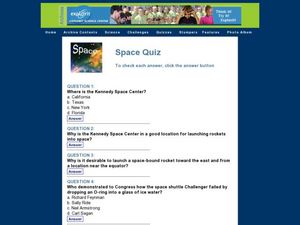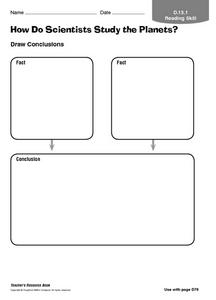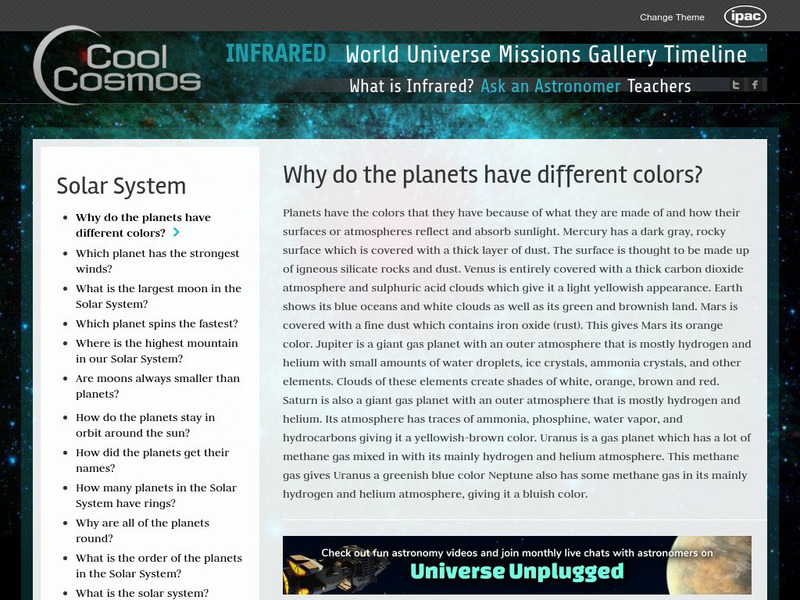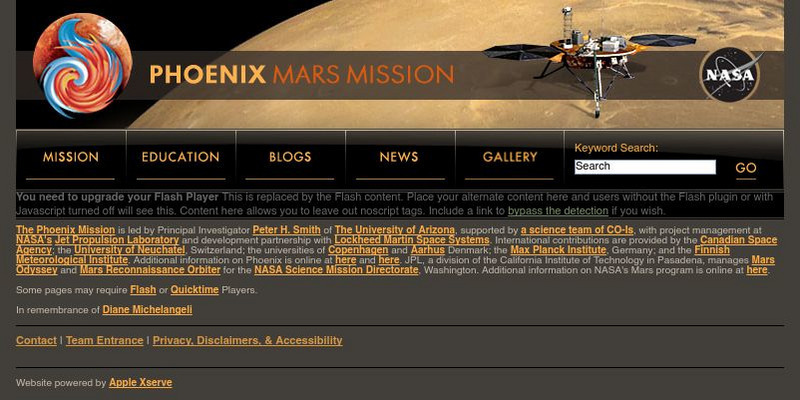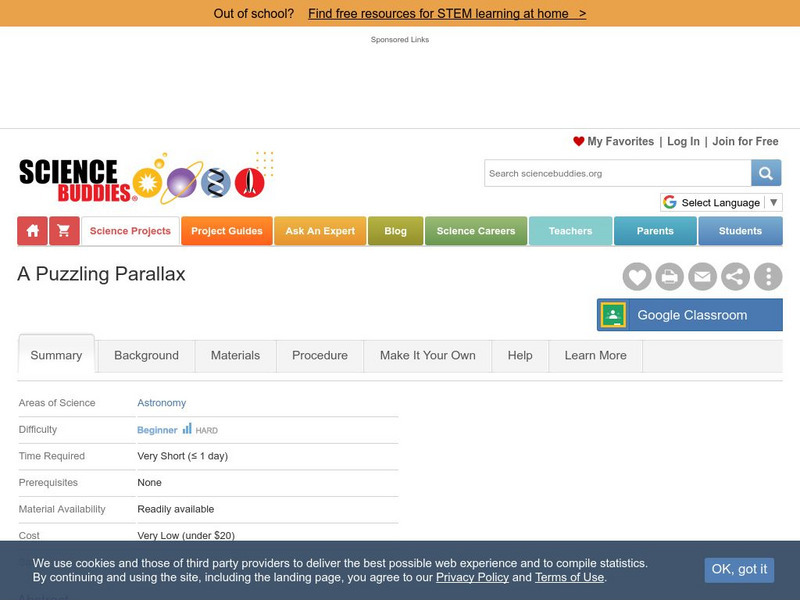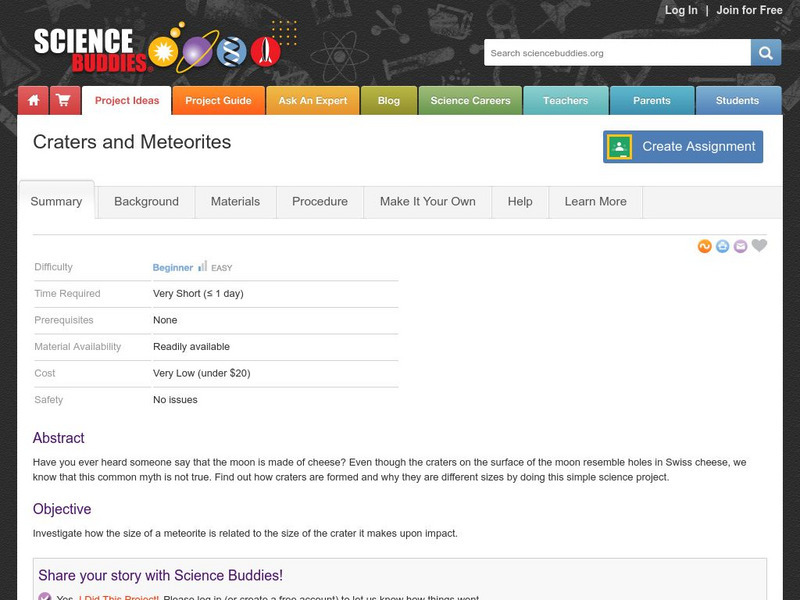Curated OER
Space Quiz
In this space learning exercise, students complete a five question multiple choice on-line interactive quiz about the American space program.
Curated OER
Astronomy 1 Quiz- Online Interactive
For this space science worksheet, students complete 5 multiple choice questions pertaining to the planets and other space bodies. This is an online interactive quiz. Prior knowledge is assumed.
Curated OER
Do The Research! Space
In this space research worksheet, students use the Internet or other sources to find facts about the planets in the solar system. Students answer 3 short essay questions.
Curated OER
Earth, Moon and Sun Assessment Test
For this space science worksheet, students answer 14 essay questions pertaining to the Earth, moon, and sun and their relationship. Prior knowledge is assumed, or this could be a pre-test.
Curated OER
Earth In Space Vocabulary Sheet
In this space science vocabulary worksheet, students read the definitions for 6 common terms. Students then look up 4 words and write the meanings. Students alphabetize the vocabulary words on another piece of paper.
Curated OER
Comets
In this space science worksheet, students learn 3 facts about comets and then read a short informational passage about comets.
Curated OER
The Sun
In this space science worksheet, students learn 4 facts about the sun. Students also read a short passage about the sun to gain more information.
Curated OER
How Do Scientists Study the Planets?
In this planets worksheet, students brainstorm 2 facts about how scientists study the planets. Then students will come to a conclusion based on their facts. This worksheet is a graphic organizer.
Curated OER
Star Chart
In this space science worksheet, students name the constellations for the location of stars and answer some related questions.
Curated OER
NASA Word Puzzle
In this word puzzle, students identify fifty five words related to NASA in a word puzzle. Examples include Clementine, space flight, throttle up, and rocket plane.
Curated OER
Pack Your Bags for a Trip to Another Planet
Student investigate and understand the planets and their characteristics and create a hypothetical travel brochure through the solar system.
Curated OER
Finding the Spot
Fourth graders use circles to "home in" on particular spots, showing the ability of scientists to locate unseen objects in space. This activity shows how scientists know certain objects exist in space due to the forces exerted by...
Curated OER
Space Settlement Design Project
Students design a space settlement to live in and give an oral presentation of their creation.
California Institute of Technology
Cool Cosmos: Ask an Astronomer
Resource compiles a list of most frequently asked questions about Mercury. Each question is linked to an astronomer's answer. Kids can explore many aspects of this wonderful planet.
California Institute of Technology
Cool Cosmos: Ask an Astronomer: Venus
Resource offers the answers to many frequently asked questions about Venus. Kids can click on the user-friendly question links to learn more about this amazing planet.
NASA
Nasa: Space Shuttle Glider
Assemble a basic scale model of the space shuttle as a hands-on activity. The activity features math-related concepts such as finding the scale of the paper model and the glide ratio of its flight.
California Institute of Technology
Cool Cosmos: Ask an Astronomer: Comets
Resource provides easy to understand information about comets. Click on the frequently asked question link to find out more about these mysterious celestial bodies.
California Institute of Technology
Cool Cosmos: Ask an Astronomer for Kids: Solar System
Resource presents information about the solar system through a list of most frequently asked questions. Click on each question and be transported to a wealth of knowledge about our solar system and the planets within it.
NASA
Nasa Quest
NASA Quest is a online resource for learning about space science. The site includes profiles and stories about NASA experts, lesson plans, and student activities, audio/video, up-to-date space science news, a question/answer section,...
University of Arizona
Nasa: The History of Mars Exploration
Explore the time line from 1960 to the 2000s about Mars Missions. Choose from news, explorations, blogs, gallery, and missions to learn more about Mars exploration.
Science Buddies
Science Buddies: A Puzzling Parallax
Did you know that ancient astronomers could measure the distance to other stars? They could also distinguish between stars and planets. How could they do that without modern technology of telescopes? See if you can discover the link...
Science Buddies
Science Buddies: Craters and Meteorites
Have you ever heard that the moon is made of cheese? Even though the craters on the surface of the moon resemble holes in Swiss cheese, we know that this common myth is not true. Find out how craters are formed and why they are different...
Seeker
Seeker: Discovery Space
Discover Space addresses broad range of topics related to space and space exploration. Subscribe to Discovery's space blogs, view a collection of videos, read interviews, and keep up with the latest space-related news and events.
ACT360 Media
Act Den: Sky Den
This journey will help you solve big questions about the universe. You will be able to see beyond human capabilities and will learn what scientists are discovering.


